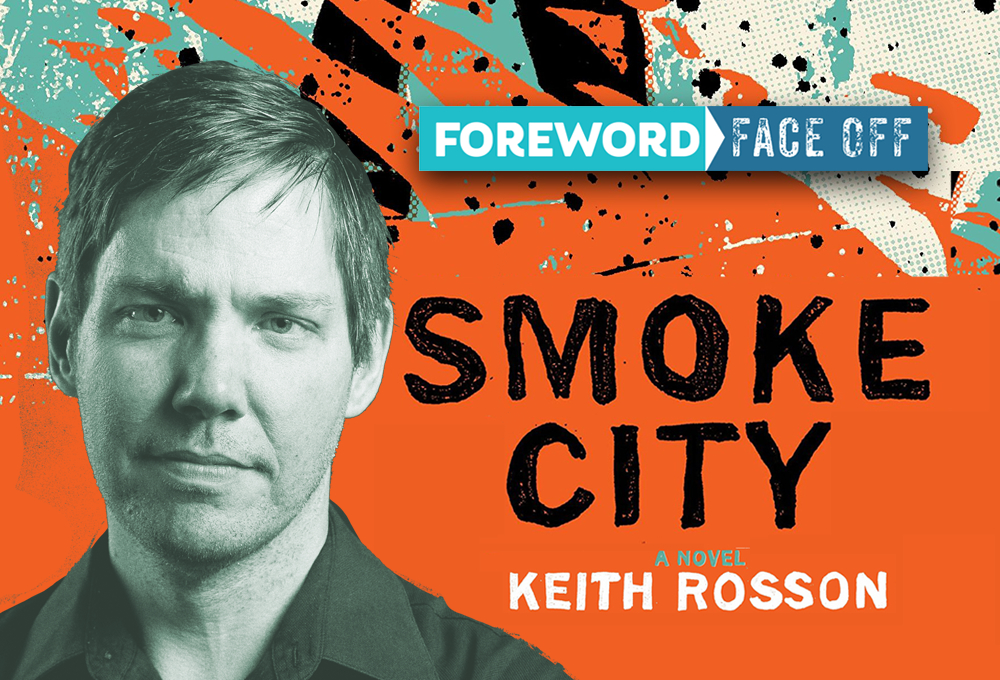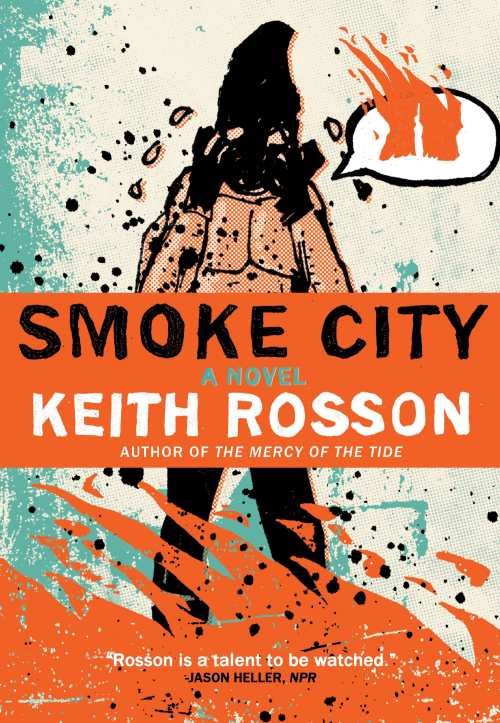Reviewer Meagan Logsdon Talks Medieval Executioners with Keith Rosson, Author of Smoke City

Whatsamatta, previous life got you down? Yeah, no doubt, reincarnation can be a drag. What’s that you say? You killed Joan of Arc? Dude, that’s cold. She was cool.
Such is the life of Marvin, modern-day protagonist of Smoke City, and the woebegotten executioner of Joan several lifetimes ago. He’s in the dumps, and damn right, he deserves to be.
At Foreword Reviews, we’re lucky to see lots of great books—alongside lots more that don’t quite have that extra something. Not surprisingly, our editorial department has a couple wannabe novelists and every so often they’re stunned by a writer’s brilliant, thunderstroke of an idea to set a novel in motion. In Smoke City‘s case, we get inside the head of the guy who whacked off Joan’s much-prettier head and learn he has a conscience and wants to make things right with the young lady—albeit, five hundred years later.
Tell us more, Keith Rosson. You had us at Joan, er, reincarnation, regrets … Anyway, we wanted to know more about the man who came up with this stuff so we asked Meagan Logsdon, who reviewed Smoke City in the Jan/Feb 2018 issue of Foreword Reviews, to ask him some meaty questions about the book and his creative process. Voila!
Your premise for this novel instantly attracted me. What initially drew you to the executioner of Joan of Arc and his quest for absolution as the central focus?

Early versions of Smoke City actually focused much more exclusively on Mike Vale, the other main character in the novel. I spent a few years and a decent number of drafts before the Marvin character was even introduced. Pretty much everything that I write, and especially novels, go through big, veering shifts in plot from the first draft to what winds up being the final, published version. Tens of thousands of words that are usually cut or shuffled around to another character. Entire plotlines chopped or ascribed to someone else. It wasn’t until I was randomly reading Régine Pernoud and Marie-Véronique Clin’s wonderful biography of Joan, Joan of Arc: Her Story, that I got the impetus for Marvin, the remorseful reincarnation of Joan’s executioner. It’s part of the joy (and struggle) of writing, this understanding that a story can and will vastly change from the first attempt to the last.
I found Marvin’s diary entries from medieval France evocative. How much research went into these? Were there any overseas trips to visit historical sites in person?
Oh, I wish! That’d be pretty great. No, this was almost entirely based on personal research, just a lot of studying of the Hundred Years War and what life in medieval France was like. After the book was done, or at least I had a solid, working draft, I was able to connect with a local historian who graciously answered a ton of my questions about Joan, 15th-century peasantry, religious life at the time, et cetera. She was able to kind of reinforce my general understanding of the time period, and offer up particular details that writers absolutely rely on, such as the fact that executioners had to wear symbols on their clothing as a way of distancing themselves from traditional society. I took plenty of writerly liberties, and I’m sure there are various historical errors in the book, but I tried my best to adhere to facts and timelines as I understood them. Though traveling to a place for research would be amazing, wouldn’t it?
The balance between raw human experience and redemptive grace is wonderfully effective. How did you maintain this balance without straying to either bleak or saccharine extremes?
That’s a great question, Meagan. And I really wish I knew how to answer it. I think so much of that sort thing just comes down to a gut feeling, something that’s almost instinctual after both reading and writing for years. Though I’ve heard from plenty of folks that my stuff pretty solidly lands on the bleaker side of things, and I can generally agree. Even when I try to tackle themes like hope and forgiveness—mainstays in my work—things generally stay moored in the grim underbelly of the story for a while. I like dark, harrowing fiction as a reader and a writer.
Paranormal investigators—are they onto something? Do “smokes” drift among us?
Well, I think a lot of it comes down to the fact that while I consider myself a writer of literary fiction, I also grew up on comic books and Stephen King novels. That stuff just gets infused into the bloodstream, you know? It’s just part of my lexicon now. I try to temper it with these anguished characters and whatnot, but ultimately, I think I owe a lot more to old X-Men and Daredevil comics than I do Hemingway or Faulkner. That said, I also want to build worlds that seem tangible and full of wonder—dark or not. Places that are maybe a bit more odd or malleable or slightly off and worrisome. It’s just more fun to do that as a writer. So I guess the answer is no, I don’t particularly believe in ghosts, but I put a lot of value in crafting stories where the unknown seems possible, seems a little more tangible than it does here.
There seem to be some religious and spiritual undertones present, though they are refreshingly subtle. How much of this is due purely to the subject matter, and how much of it is the influence of your own life journey?
Again, I think it’s mostly just an attempt at crafting a world where grand, mysterious things seem possible. And using those to discuss very real, boots-on-the-ground issues and themes. I don’t believe in reincarnation, but as a vehicle in fiction, I think it allowed me to tackle some very real concerns and questions about faith, kindness, regret, mortality.
And I must ask this of everyone. Past or present, who are some of your literary influences? Are there any in particular you would consider required reading?
I can tell you my favorite books I read in 2017, how’s that? I feel like I’ve read enough now that I don’t really have influences per se (every book I read or put down without finishing probably influences me one way or another), but there are certainly some books that I absolutely fell in love with this year.
Stephen Florida by Gabe Habash
The Glorious Heresies by Lisa McInerney
Debris by Kevin Hardcastle (stories)
The Animators by Kayla Rae Whitaker
Gangsterland and Gangster Nation by Tod Goldberg
The Cloud of Unknowing by Mimi Lipson
Knockout by John Jodzio (stories)
Can you talk about any upcoming projects you may be working on now?
Well, I’m wrapping up what I hope is the final edit on a new novel that, uh, may or may not be about a failed cryptozoologist and his hapless assistant hunting for a unicorn on a remote island in the Arctic sea. And then I’m going to work on short stories for a long time and never write another novel agaaaaaaain. (Not true, but damn, am I ready to be done with this thing. Hopefully, I’ll be able to find a home for it, we’ll see.)
Meagan Logsdon
